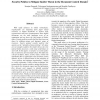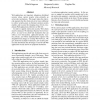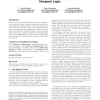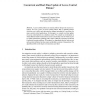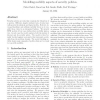87
Voted
ACSAC
2004
IEEE
15 years 4 months ago
2004
IEEE
With rapid advances in online technologies, organizations are migrating from paper based resources to digital documents to achieve high responsiveness and ease of management. Thes...
93
Voted
HOTOS
2007
IEEE
15 years 4 months ago
2007
IEEE
Web applications are important, ubiquitous distributed systems whose current security relies primarily on server-side mechanisms. This paper makes the end-toend argument that the ...
144
Voted
ECOOPW
1998
Springer
15 years 4 months ago
1998
Springer
PrincipalDomain is an administrative scoping construct for establishing security policies based on the principals invoking object services that may entail objects moving around a ...
96
Voted
ACSAC
1999
IEEE
15 years 4 months ago
1999
IEEE
Coordinating security policies in information enclaves is challenging due to their heterogeneity and autonomy. Administrators must reconcile the semantic diversity of data and sec...
133
Voted
SACMAT
2010
ACM
15 years 5 months ago
2010
ACM
We show the practical feasibility of monitoring complex security properties using a runtime monitoring approach for metric first-order temporal logic. In particular, we show how ...
91
Voted
DEXA
2003
Springer
15 years 5 months ago
2003
Springer
Abstract. Access control policies are security policies that govern access to resources. Real-time update of access control policies, that is, updating policies while they are in e...
79
Voted
DISCEX
2003
IEEE
15 years 5 months ago
2003
IEEE
The design principle of restricting local autonomy only where necessary for global robustness has led to a scalable Internet. Unfortunately, this scalability and capacity for dist...
90
Voted
CCS
2004
ACM
15 years 6 months ago
2004
ACM
A long-standing problem in information security is how to specify and enforce expressive security policies that control information flow while also permitting information release...
CASSIS
2004
Springer
15 years 6 months ago
2004
Springer
Security policies are rules that constrain the behaviour of a system. Different, largely unrelated sets of rules typically govern the physical and logical worlds. However, increa...
98
Voted
CARDIS
2004
Springer
15 years 6 months ago
2004
Springer
Smart card applications often handle privacy-sensitive information, and therefore must obey certain security policies. Typically, such policies are described as high-level security...
